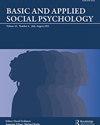当受害者被分类为外群体和内群体时,群体层面的观点采取对不公正标准和共情关注的影响
IF 1.8
3区 心理学
Q2 PSYCHOLOGY, SOCIAL
引用次数: 1
摘要
摘要本研究考察了外群体与内群体对群体层面视角采取的影响。男性和女性采取了妇女遭受工资不平等或保持客观的观点。男性设定的不公正标准较低(即,得出性别不平等是不公平的结论所需的证据较少),当他们采用女性的观点时,他们对女性的同情程度更高。对于女性来说,当她们想象外群体的情况时(实验2),这些换位思考的影响是相似的,但当她们想象内群体的情况时(实验1-4),这些影响很小或可以忽略不计。结果表明,群体层面的换位思考对共情关注和不公正标准的影响需要群体层面的自我和目标群体之间的区别。本文章由计算机程序翻译,如有差异,请以英文原文为准。
Group-Level Perspective-Taking Effects on Injustice Standards and Empathic Concern When the Victims Are Categorized as Outgroup Versus Ingroup
Abstract We investigated the effects of group-level perspective taking when the target is an outgroup versus an ingroup. Men and women adopted the perspective of women suffering from wage inequality or remained objective. Men set lower injustice standards (i.e., required less evidence to conclude that gender inequality was unfair) and experienced higher empathic concern for women when they adopted women’s perspective. For women, these perspective-taking effects were similar if they imagined the situation of an outgroup (Experiment 2) but were small or negligible when they imagined the situation of an ingroup (Experiments 1–4). Results suggest that group-level perspective-taking effects on empathic concern and injustice standards require the perception of a distinction between the group-level self and the target group.
求助全文
通过发布文献求助,成功后即可免费获取论文全文。
去求助
来源期刊

Basic and Applied Social Psychology
PSYCHOLOGY, SOCIAL-
CiteScore
4.50
自引率
12.50%
发文量
7
期刊介绍:
Basic and Applied Social Psychology (BASP) emphasizes the publication of outstanding research articles, but also considers literature reviews, criticism, and methodological or theoretical statements spanning the entire range of social psychological issues. The journal will publish basic work in areas of social psychology that can be applied to societal problems, as well as direct application of social psychology to such problems. The journal provides a venue for a broad range of specialty areas, including research on legal and political issues, environmental influences on behavior, organizations, aging, medical and health-related outcomes, sexuality, education and learning, the effects of mass media, gender issues, and population problems.
 求助内容:
求助内容: 应助结果提醒方式:
应助结果提醒方式:


